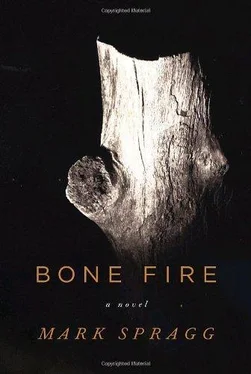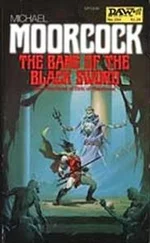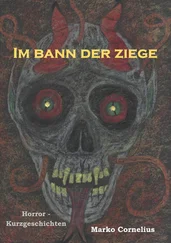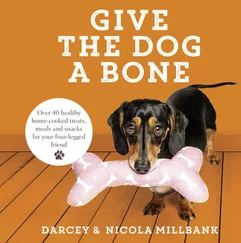She lit a fresh cigarette from the one she was done with, reaching a framed photo down from a shelf at her shoulder. She wiped the glass with the towel at her neck, then leaned over her knees to offer Crane the picture. “Right there’s what she looked like.” She eased back in the chair, watching her husband change the regulator over to the fresh bottle. “I seen that photo in the Wal-Mart and thought it was Janey herself, but it ain’t. I mean, I got no idea who that girl is there. They take them photos just to sell you the frame, but that one there I bought for the picture. If that ain’t a likeness of Janey you can kiss my fat ass.”
Crane squared the frame in his hands. The picture was of a blonde girl, her hair done into curls at the top of her head, and she wore a shiny white dress and a strand of pearls. She looked like a bridesmaid for a friend who’d gotten pregnant in high school and probably wouldn’t be going to college. “That’s a beautiful girl,” he said.
“You got that right,” the woman said.
Benton walked the empty bottle to the door and came back, bending over to squint at the oxygen gauge. He tapped it with a fingernail. “You need me to fetch you your nebulizer, sweety pie?”
“I’m fine without it for now.” She stubbed her cigarette in the plate, then pitched forward again coughing. Her scalp showed through her thin hair, reddening.
“I wish she’d give them things up,” Benton said. “Throw ’em in the goddamn ditch. You ever smoke?”
“No. I never liked the taste of them.”
“Me neither.”
“Well, good for you healthy sons a bitches.” She was sitting up sucking on her cannula. “You can give that picture back now if you’re done with it.”
He handed the picture over to her. “I knew a girl who looked something like that when I was in high school,” he said.
“I guess Benton here’s up shit’s creek now,” she said. “I been tellin’ the simple son of a bitch he can’t just park where he likes without gettin’ one of them license plates with a wheelchair on it.”
Crane stood from the couch. “I really don’t care where you park, Mrs. Grasslie. Neither one of you.”
“Well, you goddamn for sure should. What if I wasn’t handicapped? What about that?”
“If you hear from your daughter, would you ask her to get in touch with me?”
She rolled her head back, staring at the ceiling. “We ain’t gonna hear from her.”
“But if you do.”
She leveled her head. “Can I get you to leave on out of here if I say I will?”
“I guess I’m done anyway.” He had his hand on the doorknob, thinking about the young, nervous kids he’d interviewed, most of them just smoking pot on the weekends, a few of them tweaking, pale and reckless and empty. He was looking out through the thin curtain at his cruiser. “I didn’t have to come back here,” he said. “I had the GI Bill after Bush One’s war. I could’ve gone lots of places.”
“I wish I’d have fought in a war.” The skinny husband looked up from where he knelt at the coffee table, carefully placing little bars of lead into the melting pot.
Crane stared at him. “I guess I just couldn’t think of anyplace else to go.”
“I hear that,” the woman said. She tried to turn toward him but it was a hard position to hold and the effort shortened her breath. “Before you get out of here I need you to understand that we grew her up good. Got her started out right,” she said. “There wasn’t nothin’ wrong with what we done.”
“Yes, ma’am. If you say so.”
“Maybe Kayla knows where she is,” Benton said, and they both looked at him. He appeared excited by the thought.
“Kayla don’t know word one about her sister,” she said. “Or us neither.”
“You don’t know what she knows.”
“She don’t know shit from Shinola. That’s what I know.”
“I might like to ask her,” Crane said.
She slumped back in the chair, puffed out her cheeks and lit another cigarette. “Well, I hope you have a good goddamn time in Denver, then. That’s what I hope.”
“ Colorado?”
“There ain’t no Denver anything else as far as I know.” She turned to Benton, flicking the lighted cigarette at him like he was a bothersome dog. “You sure got a lot to say about girls you didn’t father,” she said.
He picked the cigarette off the carpet, keeping his head down, rubbing at a spot in the shag that had been singed.
EINAR AND GRIFF had gone to bed early and Marin had tried to sleep. But her head was pounding, the room too warm, close, even with the windows thrown open. Then the first wave of nausea hit.
She stumbled out into the hallway, drawing a robe across her shoulders, and stood clinging to the beading in the rough wooden wallboards. Her body was now soaked with sweat, but it felt better to be up and moving. She thought a cool glass of water might help.
In the kitchen she tipped a chair over, the sound of it striking the floor tearing through her like a gunshot, and her legs gave out. She sat down hard, more shocked than hurt, a collage of disjointed images from the drive west snapping through her mind as unexpected as a camera’s flash. The dank motel room in Sioux Falls, asleep for an hour in its shallow tub, the whine of traffic, the bitter coffee she brewed on the counter beside the television. There were fragments of phone poles ticking by, wires sagging with blackbirds, a ball thrown for Sammy.
She crawled to the door, leaning into the jamb, finally dragging herself out onto the porch. The air was cooler but it didn’t comfort her, as the optimism she and Alice had tried to maintain after the surgeries hadn’t comforted, and when the remembered odors of body wastes and antiseptics and salves swept through her, she vomited over the edge. She had no idea what she thought she was going to do.
She slept in ragged bouts through the night, visions cycling of Alice’s graying face, her thinning neck and hands, her hair brittle and then gone completely after the first rounds of chemo. At one point she heard the hospital’s simpleminded pastor refer to “God in His wisdom,” and recalled that she too had prayed, bargaining for her lover’s life. She felt the hollowing disappointment of the loss all over again, the wretchedness of an ineffective mendicant.
Griff found her in the morning and got her into bed. She cleaned her great-aunt’s face and hands, feeding her spoonfuls of warm sugar water, and in the afternoon she was able to sip a half cup of tea. She fell back to sleep, not waking until the next afternoon. She lay motionless in her bed, counting the knots in the ceilingboards to stay focused, feeling fragile as glassware.
That evening she had the strength to shower and dress in a clean nightgown, and Griff brought her a tray with coffee, a soft-boiled egg and toast.
She sipped the coffee, tapped the egg with the edge of a spoon. “How’s Einar taking all of this?”
“He’s been sitting on a chair in the hallway.”
“Is he out there now?” Marin turned toward the door. “Are you there?” she called.
They heard the chairlegs scrape.
“I’m right here.” He was standing in the doorway.
“Have you lost your mind, sitting out there like that?”
“I probably have.”
She shook her head and took a bite of toast. “That’s the most pathetic thing I’ve ever heard.”
He moved to the bed, reaching out gently to find her, and she patted his hand.
“I just let myself get rundown. That’s all it was.”
“Yes,” he said with some surety, as though the problem had now been resolved to his satisfaction. “That’s exactly what happened.”
***
In the afternoons they sat together on the porch, just the two of them, speaking easily of the habits of songbirds, the rising cost of groceries and gasoline, how the warming of the planet was reported vacuously-as though it were no more than the wear and tear of an ordinary garment-and how sugar inevitably destroyed a person’s vitality, and toward the end of that first week, having grown more accustomed to each other, they launched into stories from their childhood. The brandings, dances, weddings, broken bones, rodeos, storms, arguments. At times pulling their chairs around, each facing the other, reaching across their laps to hold hands.
Читать дальше












